- Home
- Steve Stevenson
The Kenyan Expedition Page 3
The Kenyan Expedition Read online
Page 3
At around three o’clock, the Masai village finally appeared from behind rolling hills. It was several miles off the dirt road, and Haida had to steer right through the tall grasses, bouncing along in low gear. “It’s a risky maneuver,” she confessed. “I don’t recommend you try it at home!”
“Third rule of survival?” Dash asked dryly. His joke made them laugh so hard that all the birds perched in a nearby acacia took flight. Pleased with himself, the young detective relaxed back into his seat and stretched his legs. “We make an incredible team, guys!” he gloated. “I bet the Masai will be delighted to see us, and we’ll finish our investigation in no time!”
A few minutes later, Dash found out he was wrong. Very wrong.
Up ahead, ten Masai warriors emerged from the trees and commanded them to stop. They were wrapped in red tunics and all held sharp spears. Haida told her companions to stay put and went to speak with them in Swahili.
Dash and Agatha held their breath, while Chandler instinctively put his hand on the rifle in case anyone threatened Haida.
“Oloibon!” the warriors erupted in chorus at the end of the discussion, then one of them left the group and started toward the village at the pace of a marathon runner.
Haida climbed back into the driver’s seat, looking worried. “They won’t let us go any farther,” she said. “I tried to convince them we weren’t tourists, but we have to wait in the Land Rover until the anthropologists arrive.”
Before Dash could protest, Agatha spoke. “That’s understandable. The tribe wants to maintain their own roots, and they don’t take kindly to strangers poking around.”
“So we’re stuck here?” asked Dash. “Is there a rest stop somewhere in the area?”
“We’re in the middle of the savanna,” replied Haida, handing him a grease-stained map. “We’d have to drive several hours to the nearest tourist facility.”
Agatha crossed her arms. “Fourth rule, dear cousin: Always bring patience!”
Time seemed to stand still, and an oppressive heat fell over them; insects buzzed and birds called, but everything else was still.
Half an hour passed before the line of Masai warriors parted to allow three people to pass. The children saw a European man and a woman with sunburned skin, dressed in tribal clothing and jewelry.
It was Patrick Lemonde and Annette Vaudeville, along with an old man hunched over a stick and speaking in an incomprehensible dialect. The two anthropologists treated him with great respect, listening to his advice and dipping their heads with reverence. Only after the old man gave his consent did the pair of scholars approach the Land Rover.
“We were afraid you weren’t coming,” Patrick said. His face looked gaunter than his photograph in the case file.
Annette’s sharp features pulled into a frown. “But you’re just kids! Do you have any idea how much effort it took to convince the oloibon we should bring in Eye International?” she said angrily.
Agatha took her reaction in stride. “Allow me to introduce the highly qualified Agent DM14,” she said, pointing at Dash. “He is the one entrusted with conducting the investigation.”
The two anthropologists exchanged dubious glances. “And the others? Are you his support team?” Lemonde wanted to know.
Haida quickly introduced the rest of the group, then gestured to Agatha, who immediately started to ask questions. “Where was the white giraffe last seen?” she asked, handing the anthropologists their map.
The anthropologists used a pen to circle the area where the giraffe herd was most often spotted. It encompassed a stand of acacias, a ridge of hills to the north, and the river that flowed along the outskirts of the village. “Hwanka would visit his tribe every morning to drink at the river,” Annette explained. “Afterward, the herd would go to a shaded area about here . . .” She circled an area a few miles from their current position.
“Hwanka?” Dash sounded surprised. “Is that the giraffe’s name?”
“It means ‘spirit of fortune,’” explained Patrick. “The oloibon believe that Hwanka’s disappearance will bring the tribe great misfortune. But they also don’t want humans to interfere with his fate . . .”
“Which means they haven’t searched the area to find out what happened, am I right?” Agatha asked shrewdly.
The two anthropologists nodded. “We obey the villagers’ rules,” Annette continued. “As I told you, it was an uphill battle to convince the village elder to make a special allowance for you to come. But now that you’re here . . .”
“What are we waiting for?” asked Dash, excited. “Let’s start looking for clues right away!”
At his prompting, Haida and Chandler quickly climbed into the Land Rover.
“Are you going to join the search?” Agatha asked the scholars before getting into the vehicle.
Annette hesitated, then stared at her colleague, taking his hand. “Go with them,” she whispered. “The oloibon has agreed to accept their help. If you bring back Hwanka, they’ll welcome you as a hero!”
They embraced quickly, and Patrick joined Agatha on the back seat. The four-by-four backed up and moved off across the grasslands, under the silent gaze of the Masai warriors and their elder wise man.
“Are we certain that Hwanka wasn’t attacked by lions, leopards, or hyenas?” Chandler asked.
“Highly unlikely,” Haida replied. “Predators don’t attack giraffes.”
Everyone waited for Patrick Lemonde to confirm this, but it was Agatha who stepped in. “It’s no doubt the work of poachers,” she declared, studying the map resting on her knees. “They wanted to capture the white giraffe and laid a trap somewhere deep in the scrub, where the herd likes to rest and the Masai warriors won’t go for fear of disturbing them.”
She scratched the tip of her nose and indicated a precise area to Haida. “I bet we’ll find a camp, tire tracks, and other signs of an ambush.”
“What makes you so sure?” asked Dash.
“News of a rare white giraffe would no doubt attract the attention of poachers, dear cousin,” she explained. “And Professor Lemonde will confirm that other giraffes have been taken within the park’s boundaries in recent weeks . . .”
Patrick looked stunned by Agatha’s thorough research. “I’m no expert on poaching, but the young lady may have a plausible theory,” he agreed. “I’d like to add that while rifle shots can be heard for miles, tranquilizer darts are silent. I’d assume these poachers knocked Hwanka out so they could take him alive.”
Haida bit her lip in a rage. “Giraffes are a protected species,” she hissed. “We have to catch whoever did this at all costs!”
She stepped on the accelerator and shifted into a higher gear, racing a bumpy path across the vast plains as antelopes, zebras, and wildebeest sprang out of their way.
They soon reached the area Agatha had suggested. Her theory about poachers proved to be correct.
“Look, I see tire tracks!” Dash exclaimed, pointing out the window.
Agatha nodded. “The mud still looks fresh, so they can’t be more than a few days old.”
“Those blackened stones must be from a fire,” added Chandler.
Patrick Lemonde pointed at the acacia grove, where several giraffes stood stretching their necks to eat leaves. “That looks like the rest of his herd!” he said happily.
Over the next few minutes, they searched far and wide for clues. Dash used his EyeNet to photograph close-ups of all the tire tracks and search for a vehicle match.
It was six o’clock in the evening and their hunt for the poachers had just begun!
Agatha called the others together to assess their findings. “All right, we’ve found cartridge cases from tranquilizer darts, footprints from four or five people, tire tracks from a jeep and a heavyweight truck, and some ropes and nets left on the ground,” she reported. “But I think the most curio
us clue we have so far in this investigation is this container.”
She passed Dash a small tin box she’d recovered near the ashes of the fire. He observed it from all angles and gave it a shake. “What’s so special about it?” he asked, unable to draw any conclusions.
“Well, first of all, open it,” she suggested.
Dash obeyed. “That’s what I thought! It’s empty!” he yelled. “Nothing inside but a strong smell of tea . . .”
“Excellent, Dash!” smiled the girl. “If I’m not mistaken, it’s a fine blend of black Ceylon.”
“And what does that tell you?” Patrick Lemonde interrupted.
“Did you notice the inscription engraved on the lid?” asked Agatha.
Haida carefully lifted the lid and read aloud, “‘A Commendation from the Most Honorable Society of British Gentlemen.’”
Everybody was speechless.
“But how does this help, Miss?” asked Chandler, confused. “There are thousands of groups like that in England.”
“But we’re in Kenya, not England,” replied Agatha. “It’s time to consult Dash’s prized gadget,” she announced with a smile. “Let’s cross-reference all the information we have, and see if the Eye International archives can make a connection.”
“Great idea!” said Dash, pulling out his EyeNet. Then he paused, scratching his cheek. “How should I do this exactly? What should I search for?”
Haida Mistery, who was learning about investigative methodology very quickly, kindly moved to his side. “Type in the inscription and see what comes up.”
“Of course!” he said. “We’ll have the results in a moment . . .”
His face suddenly went pale. “Of all the times to lose the satellite signal!” he exclaimed. “I’ll have to go to higher ground! Wait here!” He started to sprint through the knee-deep grass toward a raised outcropping a short distance away. It was a perfect hiding place for lions.
“Come back, Dash! It’s dangerous!” yelled Haida. Paralyzed with fear, the others joined in, yelling, “Stop, Dash! Turn back!”
Their cries were drowned out by the sudden thunder of hooves that spread over the valley. The ground shook as if there was an earthquake, and a herd of wildebeest stampeded across the savanna, separating Dash from the rest of the group.
A small but ferocious feline launched itself into the midst of the thundering dust cloud, and the herd of large animals veered off and thundered away. When the ground stopped moving, Dash told the others what had just happened. He was unharmed, but shaking like a leaf.
“If it weren’t for Watson, I would have been crushed by those terrible hooves,” he said in a wobbly voice. “He leaped right in front of me, and the wildebeest must have mistaken him for a lion cub.”
“Where there’s a cub, there’s a lioness.” Haida nodded.
“So when they saw Watson, they all changed direction!”
Everyone turned to look at the cat, who was licking his paw nonchalantly. His white fur had turned mustard from the flying dust.
“Watson, I didn’t know you loved Dash so much!” said Agatha happily, smothering her pet with hugs.
Chandler’s square jaw shook with emotion. “I’ll give our courageous knight a double serving of kibble this evening, Miss Agatha,” he said gravely.
Haida wanted to grab Dash by the ears and scream at him, but he had already charged back up the hill and was frantically entering data into his EyeNet.
“Did you find anything?” Patrick Lemonde asked anxiously when he returned a few minutes later. They were all on tenterhooks.
Dash shook his head, disappointed. “It was an exclusive gentlemen’s club that closed its doors in the sixties, when English colonization ended,” he grumbled. “I have a long list of former members, with photos, but it’s hundreds of people.”
“We need to narrow our search,” said Agatha. “Ideas, anyone?”
“Could we ask the park authorities for help?” ventured Chandler. “They have rangers patrolling this whole reserve looking for poachers. Perhaps they might recognize one of the faces in the photos.”
Patrick Lemonde pointed out that the authorities could easily include an accomplice or somebody else who could throw them off track. Haida agreed, bitterly adding that corruption was rampant among the park rangers. They decided to return to the Land Rover and heat up some soup on the fire. The sun was already low in the sky and dark rain clouds were beginning to gather.
Agatha got up to have another look at the tire marks left by the poachers, which grew faint where the sun-dried mud yielded to stonier ground. She scanned the horizon. “Do you think they would have taken a particular route?” she asked Haida.
Haida studied her map. “Quite often the smaller routes aren’t even marked,” she murmured. “And they’d want to stay out of sight. But we could follow their tire tracks as far as we can and then reassess the situation.”
This seemed like a good idea to the rest, and they set off just as the first raindrops started to fall.
With the rain came trouble. First, the tailgate of the Land Rover flew open when they hit a bump. Their supplies scattered into the mud and they all got drenched picking everything up. As if that weren’t enough, a mile or so later they got a flat tire and had to stop to change it. Everything took much longer than expected because of the heavy rain. They worked with clenched jaws, slipping often as the dry ground turned to deep mud, obscuring the tracks they were trying to follow. To add insult to injury, the downpour stopped as soon as they finally got back in the vehicle. They’d wasted two hours and the sky was darkening fast.
“The poachers ha
ve a few days’ head start,” Agatha said, thinking aloud. “But transporting a live giraffe over uncharted roads would be slow and tricky.”
Haida made a quick mental calculation. “If we don’t hit any more snags, we can probably travel at twice their speed,” she declared. “The problem is knowing which direction they went, now that the storm’s washed away all the tire tracks.”
“What is a ‘lodge’?” Dash asked, staring at the rain-soaked map.
“It’s a tourist hotel with tents and viewing platforms for travelers on safari adventures,” replied Agatha. Then her eyes lit up like lanterns. “Dash, you’re a genius!” she exclaimed.
“Me?” Dash sounded astonished.
“We can ask for information at the lodge,” Agatha continued, speaking quickly. “Maybe the poachers stopped for supplies, or someone on the staff noticed their truck passing through. Is it far?”
“I can’t really tell,” Dash said, lost. “Haida?”
Haida squinted at the map. Then, without a word, she pushed the Land Rover as fast as the darkness and mud would allow.
When they finally reached the hard-packed dirt driveway, they all breathed a sigh of relief. They drove straight to a lodge called Big Sea in honor of the boundless grass sea of the Masai Mara.
There were tourist bungalows and touring jeeps with pop-up roofs parked outside the main lodge. While Haida, Chandler, and Dash waited inside the Land Rover, Agatha ran to question the tourist center employees. As she suspected, the lodge’s head chef had seen a jeep and tall truck passing through. They stopped for gas, food, and water, then set off into the savanna. “And no tip for the waiter,” he said with a frown.
“Can you describe what they looked like?” Agatha asked innocently. “We’ve lost track of our friends and can’t reach them by phone. We need to know if these are the same people,” she lied, adding, “t hough our friends always leave a good tip.”
The chef gave her a detailed description. The group’s leader was a white-haired Englishman with a handlebar mustache that drooped past his chin; he was wearing a hunting cap. He had three assistants, dressed in the khaki pants commonly worn on tobacco plantations.
It was enough.
Agatha rejoin
ed her companions and asked Dash to show her the photos he’d downloaded onto his EyeNet. There was only one white-haired man with a handlebar mustache.
“We’ve got you, John McDuff!” she exclaimed excitedly.
“Who in the world is that?” muttered her cousin.
“Our mysterious poacher!” said Agatha, smiling.
Since it was too dark to continue, they stopped for the night, pitching their tent near the lodge. They woke up early and sped westward, toward the tobacco plantations. Having consulted the Eye International archives, they’d discovered that McDuff had an extensive estate there.
They followed the highway that stretched from Nairobi to a large port city overlooking the Indian Ocean called Mombasa.
“We’re nearly there,” Haida advised them around noon, lifting her hands off the steering wheel to stretch her stiff arms.
“Thank goodness,” said Dash, who was pale as a sheet from the Land Rover’s high-speed ride on the bumpy road. “I don’t think I can take too much more of this.”
“Focus on the information we’ve gathered about John McDuff,” Agatha advised him. “There’s still something that isn’t quite right . . .”
The road cut through fields of chest-high plants with broad leaves that reflected the sun like green mirrors. There were open sheds where more of the giant leaves had been hung up to dry.
“That’s a lot of tobacco,” whispered Chandler, wiping the sweat from his forehead. “If there was a fire, we’d all be smoked.”
John McDuff’s boundless plantation was dotted with small groups of workers in khaki pants, broken-down trucks, and huts with thatched roofs.
The ground sloped gently upward to form a small hill. A large colonial villa with whitewashed walls stood at the top.

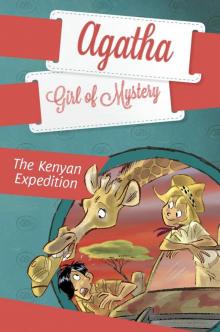 The Kenyan Expedition
The Kenyan Expedition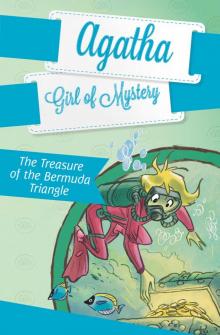 The Treasure of the Bermuda Triangle
The Treasure of the Bermuda Triangle The Crown of Venice
The Crown of Venice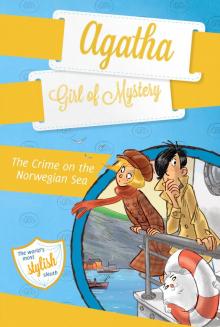 The Crime on the Norwegian Sea
The Crime on the Norwegian Sea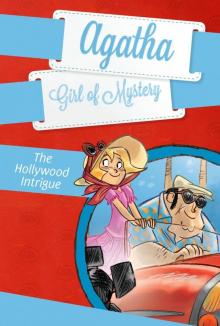 The Hollywood Intrigue
The Hollywood Intrigue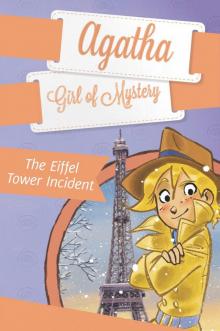 The Eiffel Tower Incident
The Eiffel Tower Incident